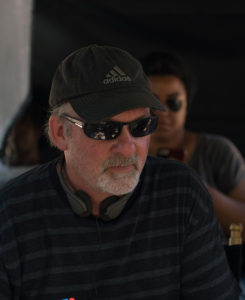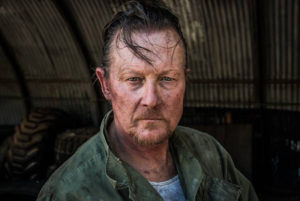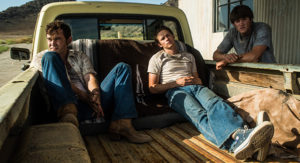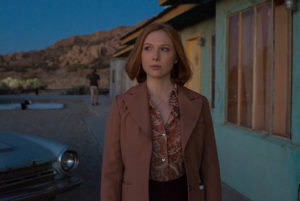 Dwight Little is mostly known for his direction in Free Willy 2, Rapid Fire, Marked for Death, Murder at 1600, and Halloween 4. Little’s more recent credits as a television series director includes such shows as Prison Break, 24, Bones, Nikita, Arrow, Sleepy Hollow, Dusk till Dawn, Agents of Shield, and Scorpion. Little’s latest film, The Last Rampage: The Escape of Gary Tison, is based on a true story set in the late 1970’s about Gary Tison, who was serving a life sentence at the Arizona State Penitentiary when his three sons broke him out. This gripping film stars Robert Patrick as Gary Tison, Heather Graham as Dorothy (Gary’s wife), Bruce Davison as Cooper, Chris Browning as Randy Greenawalt, Jason Richter as Officer Brawley Ketchum, and Molly C. Quinn as Marisa.
Dwight Little is mostly known for his direction in Free Willy 2, Rapid Fire, Marked for Death, Murder at 1600, and Halloween 4. Little’s more recent credits as a television series director includes such shows as Prison Break, 24, Bones, Nikita, Arrow, Sleepy Hollow, Dusk till Dawn, Agents of Shield, and Scorpion. Little’s latest film, The Last Rampage: The Escape of Gary Tison, is based on a true story set in the late 1970’s about Gary Tison, who was serving a life sentence at the Arizona State Penitentiary when his three sons broke him out. This gripping film stars Robert Patrick as Gary Tison, Heather Graham as Dorothy (Gary’s wife), Bruce Davison as Cooper, Chris Browning as Randy Greenawalt, Jason Richter as Officer Brawley Ketchum, and Molly C. Quinn as Marisa.
The facet that drew director Little to this specific project is that it was ultimately a father and son story. It’s also an interesting crime and prison escape tale. As Little was developing The Last Rampage script with Alvaro Rodriguez, simultaneously he had been shooting a Dusk till Dawn scene with Robert Patrick down in Austin, TX. During the scene, the director was so impressed with Robert Patrick’s versatility, he knew the actor was the ideal fit for Gary Tison. The director approached Robert because he had worked with him three times previously on Dusk Till Dawn, X-Files, and then more recently on Scorpion.
Little explains his relationship and experience working with Robert Patrick. “When you work together on a film, what’s kind of fun is that it’s just the two of you. There’s no layers…such as no network, no studio, no showrunner, no writer, or just nobody to report to. You are doing a creative work as a collaboration. When you come up with an idea that you both love or something that may be slightly off script or is a little different like an improv, you don’t have to clear it or anything. It feels creative for both the actor and director. It’s much stronger and a more liberating experience.”
Beyond casting Patrick, Little had been a fan from afar of Bruce Davison going way back to his film school days at USC, as Davison acted in a student film entitled Short Eyes, which was very moving.
 “I had been aware of Bruce Davison for 30 years and was surprised I had never worked with him neither in TV nor film. I went after Davison through casting director, Maureen A. Arata, and wondered if there was any possibility. He liked the script, but when he had heard Robert was in, that spoke to him because people respect Robert as an actor.”
“I had been aware of Bruce Davison for 30 years and was surprised I had never worked with him neither in TV nor film. I went after Davison through casting director, Maureen A. Arata, and wondered if there was any possibility. He liked the script, but when he had heard Robert was in, that spoke to him because people respect Robert as an actor.”
After Davison became attached, Little then approached Heather Graham’s manager for another actor to play the role of Carolyn Simmons, not knowing that the manager would suggest Heather for Dorothy Tison after reading the script. Little explained, “It’s not the obvious thing you think since Heather Graham is such a beauty. We thought about it for a minute and were thinking it would be so unexpected for us, so Heather and I spent hours on the phone talking about her part.” As Graham studied the real-life Dorothy, she concluded that Dorothy’s identity was tucked away in attending church. The character was rooted in a religious subtext. It’s not right there on the surface, but it was under everything.
It was only natural to cast Jason Richter as Little and Richter had both worked together several times on various projects. Jason Richter is often known as the Free Willy kid.
“The chemistry between the actors was phenomenal for many reasons. Robert is a consummate professional . He’s been doing this so long, he knows his craft. He’s always on time, always on set, knows what the camera is doing, and brings all those years of training. So the boys were watching this incredibly experienced actor; he was their father in the movie, but also their father on set. If they had questions about what they should be doing with that camera or what’s going on, they could talk with him. The actors were young and looked up to him.”
The three sons were played by Alex MacNicoll as Donnie (oldest son), Casey Thomas Brown as Ray (middle son), and Skyy Moore as Ricky. All three were obviously differentiated by age and innocence. Donnie was previously in the military, an independent thinker, and it is obvious he is the eldest. Ray is the middle child and very loyal to his dad, to the point where he only sees a narrow perspective. As the youngest son, Skyy is depicted as a person who is a little more fragile, naive, and with an awe shucks mindset.
Molly C. Quinn, as Marisa, the reporter, had a natural affinity for working with Graham. Their scenes and relationship was a special one as it very much displayed a mother/daughter interaction. Little noted,
“The chemistry was instant and very mother/daughter. There’s a thing in the movie where Heather gets confused and lost in what’s happening and starts thinking Molly is actual her daughter. But on the flip side, Molly is super experienced; she’s been doing this since she was a kid, and a complete pro. Emotionally, I think they took care of each other and found a mother/daughter dynamic.”
 As all films are created with a certain point of view in mind, director Little enlightens us with his personal perspective and character outlook. “I tried to come to the project through Donnie’s point of view. So as the director, it’s not really Gary’s POV, who am I in this mix? It’s really Donnie, because he’s reluctant, doesn’t want his brothers to get into trouble, so decides to make sure they’re okay, and then goes along with his dad for a while and tries to be a team player. He just wants to get to Mexico, and put this behind him. Donnie had a chance at a real life, because he had been in the service and could’ve been somebody. Watching Donnie watch Gary change, I guess I felt like I was dying. That’s the best way I can see it.”
As all films are created with a certain point of view in mind, director Little enlightens us with his personal perspective and character outlook. “I tried to come to the project through Donnie’s point of view. So as the director, it’s not really Gary’s POV, who am I in this mix? It’s really Donnie, because he’s reluctant, doesn’t want his brothers to get into trouble, so decides to make sure they’re okay, and then goes along with his dad for a while and tries to be a team player. He just wants to get to Mexico, and put this behind him. Donnie had a chance at a real life, because he had been in the service and could’ve been somebody. Watching Donnie watch Gary change, I guess I felt like I was dying. That’s the best way I can see it.”
As the phenomenal actors demonstrated incredible performances, a greater purpose existed beyond themselves, which was for the entire film to create a singular intended message to the audience. Little noted, “The message I wanted to portray is that the sins of the father do carry from generation to generation. Some of the ongoing cycles include alcoholism, abuse, neglect, laziness, sloth, violence, work ethic, moral conscience, and/or good things. As sons, we are a little bit at the luck of the draw, in terms of who we get as our father. If it’s a dark influence, it’s very difficult to break free and not repeat the pattern. The sins of the father travel. If you have a father who believes in you, who supports you, who teaches you good values; that is a gift, but not everybody gets it. I am a son, and my father had a big influence on my life. I see a lot of people who didn’t have a good father, and see them suffer in multiple divorces, lots of domestic problems, substance abuse, and lots of wreckage that happens.”
“Of all my movies,” Little revealed, “I’ve always tried to bring something personal to them and they share some similarities. The most exciting thing for me is that it’s personal, not a corporate product, and not a green light from a studio or network. As much as people respected the script, no one wanted to make this movie. We just made the movie and it was creatively fulfilling cutting it.”
The Last Rampage: The Escape of Gary Tison is available ON Demand/Digital HD.





